Some books not only challenge our preconceptions but also change our worldview. One of these is Drug Cartels Do Not Exist: Narcotrafficking in U.S. and Mexican Culture, by the Juarense author and scholar Oswaldo Zavala. In the following audio interview, which you can also download like a podcast (see link above), he explains what he means by the provocative title of his book, first published in Spanish in 2018 (the English translation will be coming out early next year). By challenging the term cartel, he reveals an entire world behind the drug war, one that is anchored in official national security discourse.
In the interview Zavala talks about his time as a reporter in the 1990s in Ciudad Juárez and how that experience informed the argument of Drug Cartels Do Not Exist. We talk about what Zavala calls the “national security storytelling machine” and how the exaggeration and caricaturizing of drug smugglers (also reflected in the broader culture in television shows) justifies mass militarization (including, of course, the ever-increasing fortification of the U.S.-Mexico border) while masking other elements at play, such as huge extractive projects. These projects are often happening in the same places where the media focus on drug cartels in combat.
Zavala’s paradigm-shifting book also connects the waves of violence and homicides in Mexico over the last 15 years to the upsurge in this militarization, rooted in counternarcotics operations unleashed by the Felipe Calderón administration in 2006 under pressure from the United States, which provided help and eventually financing. But listen for yourself. I guarantee you won’t think about the war on drugs the same way again.
If you like what we’re doing at The Border Chronicle, please consider becoming a paid subscriber. It’s just $6 a month or a discounted $60 for an annual subscription. Or even better, become a founding member and receive four additional subscriptions for your friends and family. This helps us make The Border Chronicle sustainable so that we can continue challenging narratives and keep the government and corporations accountable for their actions.

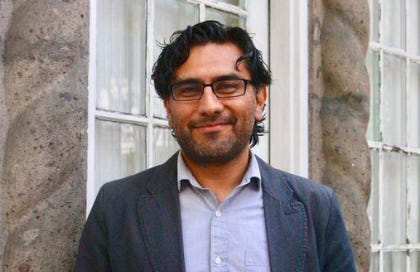



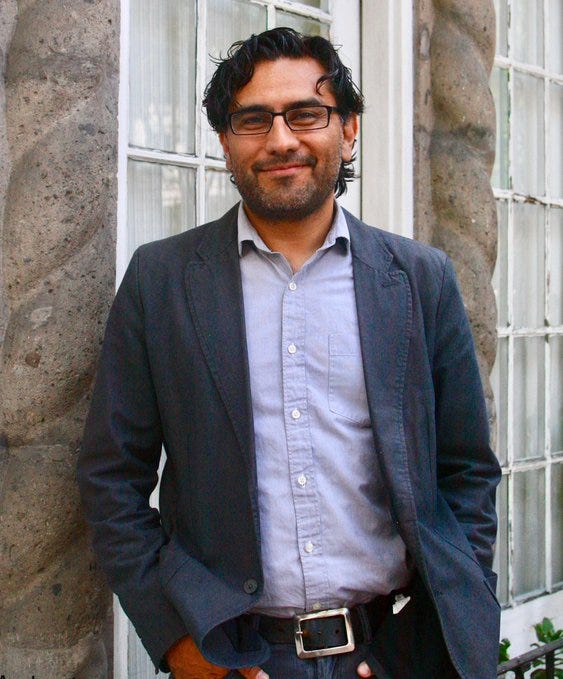



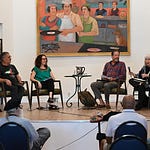


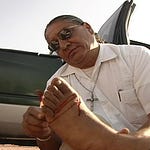

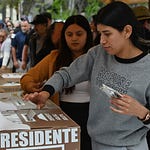
Eye opening talk. Ideas discussed can be a way to gain an understanding on the bigger forces that are shaping the border. I am thinking specifically on the discussion on official language (language that is used by the U. S. and the Mexican governments) and how it has the power to override the reality that us who live in the border experience.
I also wanted to mention to those readers that can read Spanish that the book discussed (Los Carteles no Existen - Narcotrafico y Cultura en Mexico) can be easily purchased as an e-book in the U. S.
This conversation is so interesting to me. The US can ignore a (local) GANG problem in MX and C - but the DRUG CARTELS (who facilitate drug traffic into the US) affect us in a more significant way and create a perfect excuse for the US to build border walls and increase national security. I am particularly interested in OZ's comments about using drug cartels as an excuse to allow police/governments to enter villages where there is indigenous unrest because of extractive industries - especially in Guatemala (I am less familiar with MX) Don't miss this University of Arizona charla about journalism in MX being in danger because, in part, of the drug cartels (I think they attribute 30% of the journalist deaths to drug cartels)
https://las.arizona.edu/events/charlas-con-caf%C3%A9-surviving-mexico-resistance-and-resilience-among-journalists-twenty-first
Please keep up the good work, Todd and Melissa
Thank you for your comment Alyson. I do believe that part of the gang imaginary that prevails in Central America derives from the "national security" discourse from the US. Even the notion of a "Northern Triangle" always brings to mind the way the US security talk labels conflict zones militarily (think of Iraq's "Sunni Triangle" of insurgency or Mexico's "Golden Triangle" of poppy and marijuana crops, for example), criminalizing poverty and justifying forced displacement. It is always extraordinary to read how repeated and redundant stories of victimized migrants by Central American gangs (and later by Mexican "cartels" as they journey to the north) automatically explain the violence in the region without any reference to extractive projects and the militarization of those affected areas. Thank you again for listening to the interview!
Thanks, Alyson, for your comment. I'll ask Oswaldo what he knows about that phenomena in Guatemala, who knows he might even be inclined to comment here too! And will definitely check out the charla you shared, Surviving Mexico is an accomplishment.
Thank you Alyson. We're looking forward to Oswaldo's book coming out in English soon. Surviving Mexico is also an excellent book. We definitely want to focus on this topic more in the future.